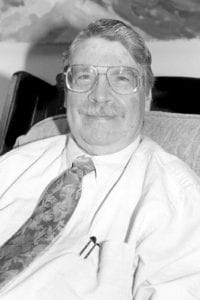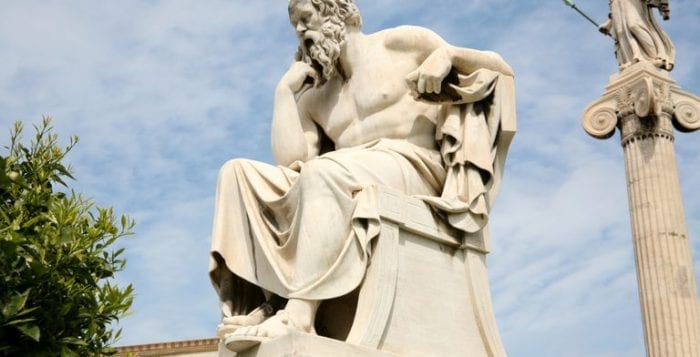By Elof Axel Carlson

It is impossible to know ourselves in all the aspects of our lives that we can examine. But we can know a lot about ourselves through science.
I will start at the level most of us operate in — the macroscopic world in which we see ourselves as a person. I see myself as an old person, almost 85 years old. I see myself as a male, a husband, a father (three out of six of our children still living). I also see myself functionally — I am a scientist, a geneticist and historian of science.
I have 12 grandchildren and three great-grandchildren. I am an American, born and mostly raised in Brooklyn. I did my undergraduate work at NYU. I got my doctorate at Indiana University with Nobel laureate H. J. Muller. I presently live in Bloomington, Indiana. I have sailed around the world twice teaching on board Semester at Sea. I have had 12 books published. I loved teaching and doing research at Queen’s University in Canada, at UCLA and at Stony Brook University.
Biologically I have some knowledge of much of my gross anatomy and as a biologist I have some familiarity with my organ systems and how they work. I have observed some of my cells under a microscope when I took a course on histology at NYU as an undergraduate and I prepared slides of my blood. I have seen my 46 chromosomes when I had my karyotype taken some 50 years ago at UCLA. I have not yet had any of my 20,000 genes sequenced.
But even if I had my entire genome sequenced, I know that no one reading those sequences would be able to infer my life described in the first three paragraphs of this essay because our social traits are largely acquired by where we grow up, the circumstances of our lives in the generation in which we are born and a good measure of luck.
It was luck that gave me an opportunity to read classical literature aloud for five years to a blind teacher in my high school. It was luck that made me meet the person to whom I am now married, and Nedra and I have had 58 wonderful years together.
I am part cyborg with eye glasses (for reading), cataract-free plastic lenses in my eyeballs, six implants in my jaws and two hearing aids. I have the benefit of an altered immune system created by vaccinations that have spared me from diphtheria, typhoid fever, smallpox, pneumonia and many varieties of influenza. I’ve lived through measles, mumps and chicken pox without bad outcomes. When traveling around the world, I prevented malaria by taking daily Atabrine pills. I would probably have died 10 years ago had there not been statins to regulate my cholesterol metabolism.
I know how I am connected in many ways. My biological ancestors are Swedish on my father’s side and Ashkenazic Ukraine on my mother’s side. My intellectual pedigree through Muller I have traced to Darwin, Newton and Galileo. It made me aware of how few compose the world of scholars in the immense diversity of humanity.
I owe to many books aspects of my personality, values and goals in life. From Goethe, I have a Faustian personality and try not to repeat my activities each year. From Montaigne I learned to write personal essays. From Samuel Pepys I learned to keep a diary (over 100 volumes and still going). From Freud I learned to sublimate my discontents into works that enrich civilization. From Darwin I learned how all of life is connected and can be related to the past through his theory of evolution by natural selection.
From Socrates I learned the importance of trying his credo, “Know thyself.” From Job I learned the inscrutability of fate and how limited is our control over our lives. From Kant I learned that ethics and moral behavior can be constructed from reason. From Epicurus and Epictetus I learned that one of the great benefits of life is choosing well and using, as best we can, what talents we have within the limits imposed by society’s circumstances.
I think of myself as composed of layers of units. I am a unique organism. I have numerous organs that compose my physical being. I am composed of several trillion cells.
The gene activity in my body and mind are in constant associations with past, present and anticipated activities of cells, some switched on, others off, and at different times and in different places in my body. It is a biological symphony of which I am mostly unaware.
My cells have organelles that are also working on and off to make molecules, digest molecules and recycle molecules. My organelles are composed of macromolecules whose organization and function have been worked out mostly since I was born. I know nothing of my life at the level of individual atoms save for those that are passing through membranes and ion channels or transported by proteins in my cells.
I also know an important lesson of life. There is an enormous amount we do not know and humility alone should restrain us from acting as if we have certainty on our side, especially if our beliefs lead to intentional or unintentional bad consequences. Know thyself may and does celebrate life but it can also be taken as a warning.
Elof Axel Carlson is a distinguished teaching professor emeritus in the Department of Biochemistry and Cell Biology at Stony Brook University.





